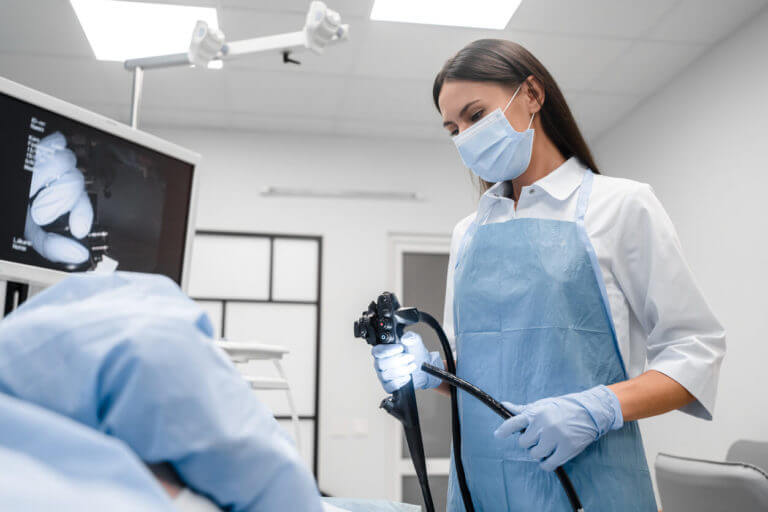
Scheduling a colonoscopy can feel overwhelming, but knowing the process makes it much easier. This essential screening procedure helps doctors detect colorectal cancer early, when treatment works best. Many people delay this test due to concerns about cost, insurance coverage, or preparation requirements.
This guide will walk you through everything you need to know about scheduling your colonoscopy. We will cover insurance considerations, typical costs, and preparation steps.
Insurance Coverage for a Colonoscopy
A colonoscopy screening is often listed as a preventive service under the majority of insurance plans.
The Affordable Care Act requires insurers to cover these screenings without charging you copays or deductibles. This is true if you follow standard screening rules and use doctors in your insurance network.
Coverage for Polyp Removal
If doctors find and remove polyps during the screening, your insurance might cover it differently. Some plans consider polyp removal as a diagnostic service instead of a preventive one. Check your insurance coverage before scheduling an appointment. Doing so can save you trouble later.
How to Confirm Your Coverage
It can help to contact your insurance provider beforehand to ensure they cover the procedure. Ask about gastroenterologists in your network and get a list of approved places where you can have the procedure.
Medicare Coverage for Colonoscopy
Medicare can cover colonoscopy screenings every 10 years for individuals with average risk. Medicare Part B covers the procedure if you use approved providers. If there are no polyps discovered, you will likely not have to pay anything out of pocket for the screening.
Understanding Colonoscopy Costs
The cost of a colonoscopy can vary a lot. It depends on where you live, the provider you choose, and your insurance coverage.
If you do not have insurance, the procedure usually costs between $1,000 and $3,000. This amount includes the doctor’s fee, facility charges, and anesthesia costs.
How Location and Facility Affect Costs
Where you live can greatly affect the price. Urban areas often charge more than rural areas. Procedures done in hospitals usually cost more than those done in outpatient surgery centers.
Additional Costs to Consider
There may be extra costs for things like consultation fees, laboratory tests, and pathology services.
If doctors find and remove polyps, you may have to pay more for the biopsy and analysis. These services are often billed separately from the main procedure.
Options for Lowering Costs
You can also ask your healthcare provider about alternative payment options. They may offer them if you do not have insurance. Some facilities have sliding scale fees based on your income.
You can also look into community health centers, which may offer lower-cost screening options.
Preparing for Your Colonoscopy
Preparation for your colonoscopy begins a few days before the procedure. You will receive specific instructions from your doctor. It is important to follow these instructions exactly to get the best results.
Change Your Diet Three Days Before
It is likely that you will have to modify your diet a few days before your colonoscopy. Some foods to avoid will be:
- Foods high in fiber
- Nuts
- Seeds
- Some fruits and vegetables
You will receive a complete list of what not to eat from your doctor.
Drink Only Clear Liquids the Day Before
You can only take in clear liquids on the day itself. For example, you can have water and clear broths, but no solid foods. Do not drink red or purple-colored liquids because they can affect the examination.
Take a Bowel Preparation Solution
You will need to take a bowel preparation solution to fully clean your colon. This medicine will cause frequent bowel movements to empty your intestines.
The process may feel uncomfortable, but it is very important for accurate results.
Day of the Procedure
Arrive at your appointment with a responsible adult who can drive you home afterward. After sedation, it is unsafe to drive or operate heavy machinery for 24 hours. It would be a good idea to have another individual accompany you for the rest of the day.
The medical team will review your medical history and current medications. They will start an IV line and administer sedation to keep you comfortable. You will likely have no memory of the actual procedure.
After the colonoscopy, you will recover in a monitored area until the sedation wears off. You and your companion will discuss the initial findings with your doctor, so you can plan what to do next. You will receive written instructions for post-procedure care.
Post-Procedure Care and Follow-Up
Most people feel normal within a few hours after the procedure. You may experience mild cramping or bloating from the air used during the examination. These symptoms typically resolve quickly with walking and time.
You can resume your normal diet right after the procedure unless your doctor advises otherwise. Start with light foods if you feel nauseous from the sedation. It is also important to stay hydrated, so drink plenty of water.
Your doctor will contact you with biopsy results if tissue samples were taken. Normal results mean you can wait 10 years before your next screening colonoscopy. Abnormal findings may require more frequent monitoring or additional treatment.
Scheduling a Colonoscopy in West Orange, NJ
Scheduling a colonoscopy is an important step in protecting your long-term health. This screening can detect problems early on, when treatment is most effective. Knowing insurance coverage, costs, and preparation requirements helps you feel more confident about the process. Most patients find the procedure much easier than they expected. The peace of mind that comes from normal results makes the temporary inconvenience worthwhile.
Hudson MD Group provides comprehensive colonoscopy services with experienced gastroenterologists. Our team will guide you through every step of the process. We work with most insurance plans and offer flexible scheduling options. Call Hudson MD Group at (973) 705-4914 or use our online appointment request form to request a consultation. Do not wait—early detection saves lives.
We look forward to serving you!


